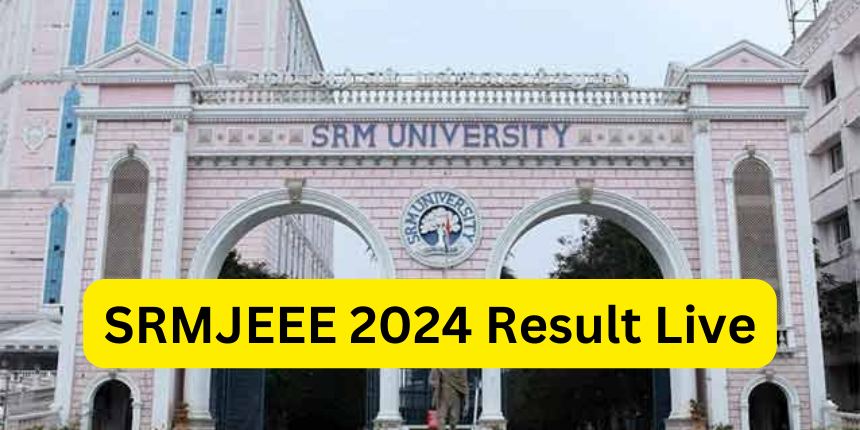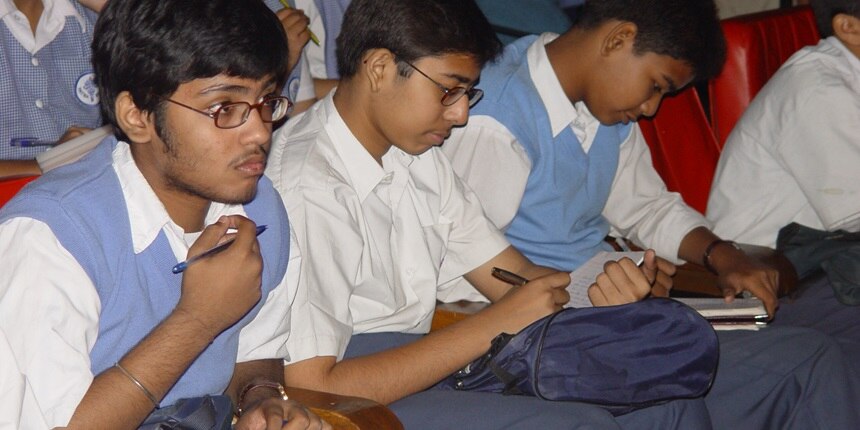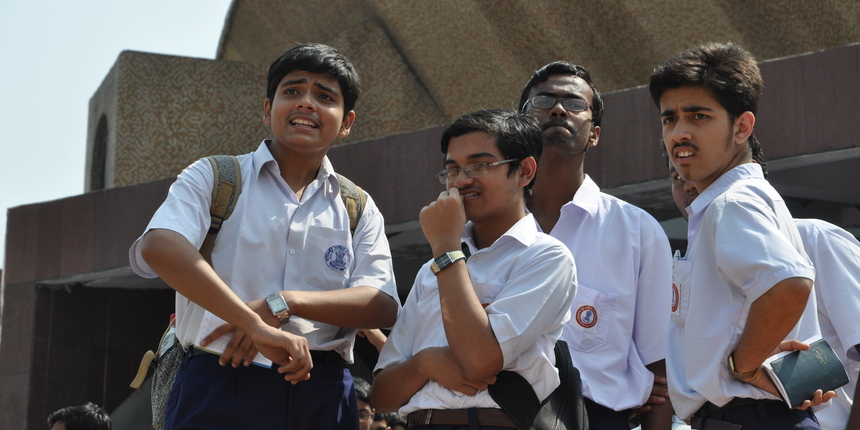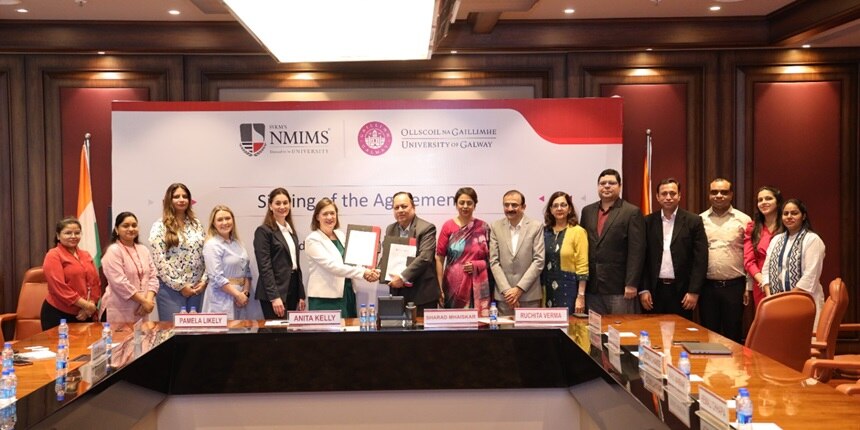Engineering at JNU and DU comes with riders
Universities known for science and humanities started engineering courses, but infrastructure and placement woes persist.
Colleges/Universites Accepting CUET Score
Download list of Colleges/ Universities Accpeting CUET/CUCET Score with Cut-OFFs
Download Now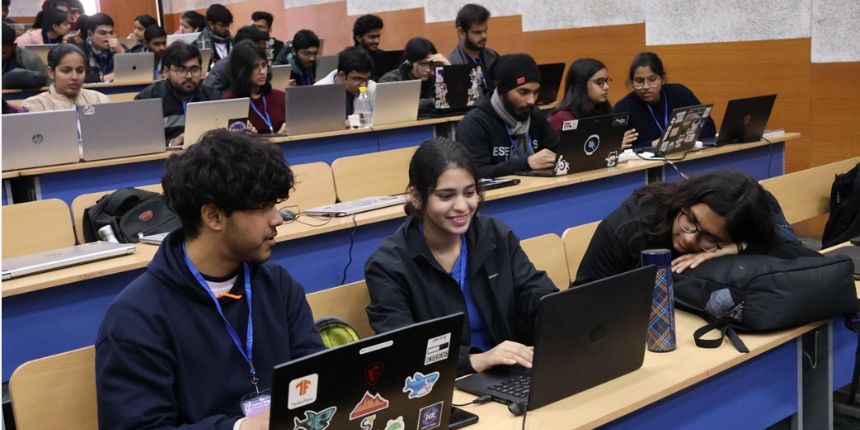 BTech Computer Science and Engineering (CSE) students during a hackathon at Jawaharlal Nehru University. (Image: By special arrangement)
BTech Computer Science and Engineering (CSE) students during a hackathon at Jawaharlal Nehru University. (Image: By special arrangement)Team Careers360 | April 16, 2024 | 05:05 PM IST
By Sanjay & Shradha Chettri
NEW DELHI: In a move to become multidisciplinary, two central universities – Jawaharlal Nehru University (JNU) and Delhi University (DU) – started undergraduate engineering (BTech) courses. Both are otherwise known for their expertise in the general sciences, humanities and commerce. JNU has been running the course for nearly five years but students are still grappling with problems of infrastructure, labs and off late, even placements.
DU, however, had engineering institutes under its ambit till 2018 when the last one became a university. Delhi College of Engineering became Delhi Technological University (DTU) in 2009 and Netaji Subhas Institute of Technology became Netaji Subhas University of Technology (NSUT) in 2018.
The BTech courses DU started in 2023 were a separate experiment. During the first year, the primary struggle had been around filling seats; BTech in electrical engineering had only 13.2% of the total seats occupied.
JNU engineering
The central university’s School of Engineering (SoE) launched two engineering courses in 2018, unique five-year dual degree programmes combining a BTech in an engineering discipline with a master’s, MTech or MS, with specialisation in social science, humanities, science or technology. In 2022-23, this was replaced with a traditional four-year course.
Now, the school offers two four-year BTech programmes – computer science and engineering (CSE) and electronics and communication engineering (ECE) – with a total of 126 seats. Admission is based on the Joint Entrance Examination (JEE) Main.
Officials said students enrolled in SoE considered JNU’s National Institute of Ranking Framework (NIRF) position and the prestige associated with the institution. They also considered the learning environment at the JNU campus where they get to pursue engineering and interact with students of other streams.
Aayush Kashyap, in fourth year of ECE, had a JEE Main rank of about 15,000 but chose JNU over NSUT and DTU. “It is a prestigious university and has students from all over the country. The social environment which I see at the JNU campus cannot be seen at any other engineering college. In the initial years, when JNU was offering five-year BTech courses, we used to interact with students and professors of the humanities stream as well. We chose our elective courses from different schools of the university offering humanities subjects. This helped us learn and improve our knowledge about other subjects,” he said.
Aayush Kumar, in the final year of the now-discontinued dual-degree ECE programme, said he considered JNU “because of its NIRF ranking and prestige”. “Professors who teach here are at par with IITs and it has been a good learning experience,” he added.
The original five-year programme allowed Aditya Sharma, enrolled in computer science engineering, to do his MS in management. He wanted to shift from technology to management and also prepare for government jobs.
“If you just want to make a career in coding, you can get a better engineering college than this. However, you will learn various other subjects here. You will gain enormous knowledge about the social environment of the country. JNU is known for producing the country’s top bureaucrats and many of the students also go for UPSC preparation after completing their courses here,” he said.
Ankit Chaudhary, professor and acting dean, SoE, said JNU has been in the forefront of producing leaders in different areas, including bureaucracy, politics, and art. “Now JNU is also participating in developing technical manpower,” he said.
DU’s Faculty of Technology
DU launched three engineering courses in 2023 – BTech in electrical engineering; electronics and communication engineering; and computer science and engineering. Each course has 120 seats and again, admissions are based through JEE Main.
Despite DU’s storied history of running engineering institutes, its faculty of technology has struggled to draw students.
As per the data collected from the university, just 13.2% of the seats in BTech electrical engineering (EE) were filled; electronics and communication (ECE) fared better with 46.1% seats filled. But computer science and engineering (CSE) – arguably the most popular engineering branch in the country – managed to fill just 40.7% seats.
This year, it hopes to do better. Sanjeev Singh, dean of the Faculty of Information Technology, told Careers360, “Last year, the admission process started late but despite that we got a large number of students. Some of them were high rankers. This time we will surely have better numbers.”
Of the total enrolment, 86.2% are men and 13.8% women. The university has so far hired 12 permanent faculty and the process of recruitment is underway.
Also read 25 new BTech, other engineering courses at IITs, NITs, CFTIs: A list
Students from many states
Engineering students who opted for DU, did for similar reasons as their JNU counterparts. “I was getting NSUT but I thought Delhi University was a bigger brand. My parents had also studied engineering at DCE,” said one, asking not to be named. He is from Rajasthan.
The students are from all over the country, but most hail from Uttar Pradesh, Bihar, Rajasthan, Haryana and Kerala. Interestingly in the EE course, a large number of students are from Kerala and Ladakh. In the CSE course, Punjab, Telangana, Tripura and Assam are the highest contributors.
Unlike other courses in DU, the engineering programme is self-financing. The fee is Rs 2.16 lakh for a year. The university reimburses Rs 50,000 for purchasing computers.
“We also give scholarships. We give 90% scholarship to those whose family income is less than Rs 4 lakh, and 50% scholarship to those with less than Rs 8 lakh family income,” added Singh.
In future, the faculty plans to set up semiconductor design facilities, renewable energy technologies, advanced control systems and have wide collaborations.
End of five-year BTech, new courses
Though unique, JNU abandoned its five-year dual-degree course in 2022-23. Chaudhary said the programme suffered from “a few administrative issues”.
The fees for other JNU schools are lower for BA, MA courses but if engineering students attended these schools for their master’s, they were paying the engineering school fee. So, many opted to exit after the fourth year and join the second school through direct admission. Plus, the shift of students from SoE to other schools “created administrative chaos” – as Chaudhary put it – as the second school would refuse to take responsibility for the administrative work related to engineering students. There were scheduling conflicts rendering engineering students unable to join internships on time. And finally, the MS degree was not considered equivalent to an MBA or MSc by recruiters. “Many companies refused to interview these students,” he said. As a result, the dual-degree was replaced with standard BTech ones.
JNU will start offering three MTech courses – CSE, ECE and materials science and technology – from next year and plans to launch “two new BTech programmes in some areas of computing in the near future”.
Infrastructure issues
The engineering school in JNU has been receiving criticism from students due to the lack of infrastructure despite the high fees. At DU, where the latest engineering programme is only a year old, students face problems as well.
The tuition fee per semester of BTech for 2024-25 is Rs 20,833 for general and Other Backward Classes (OBC) students with family income within ₨ 1-5 lakh, and Rs 62,500 for those with higher family income. No tuition fee is charged from the General and OBC students from economically weaker sections with family income below ₨ 1 lakh, or students from the Scheduled Castes (SC), Scheduled Tribes (ST) and Persons with Disability (PwD). However, all students are charged Rs 5,500 per semester and Rs 2,000 one-time admission and alumni fee.
“Most of the programmes in JNU are BA and MA, so we can’t compare engineering courses with them. As an engineering college, we are much cheaper compared to IIT Delhi, IIIT Delhi, NIT Delhi or Delhi Technological University (DTU),” Chaudhary said.
JNU’s engineering school does not have its own building. Students take classes in different schools. Laboratories are also not fully functional.
“Faculties at SoE are very good. However, infrastructure is underdeveloped. SoE does not have its own building. We have been allotted a lecture complex and a fraction of the School of Computational and System Sciences (SCSS) for labs and offices.
Labs are not set up properly and we do face some problems in getting hands-on training and carrying out experiments. Now, the JNU administration is setting up proper labs for upcoming batches,” said Kashyap.
Dinesh Dhandhal is in final year of BTech in ECE and is now pursuing an MS in international relations (IR). Dhandhal said most engineering students stay in Damodar hostel and face problems in reaching the engineering lecture complex, 2.5 km away. “There have been instances when students got a message about a class getting cancelled after they had reached the lecture complex in the scorching heat. And then, when they go back to their hostels, they are informed that they have an extra class at the complex. Classes of engineering students are held at four different schools and cabins of professors are also spread across the campus. Students face transportation problems in reaching them,” he said.
Dhandhal had the option of doing MS in Radio Frequency (RF) and microwave in fifth year but decided against it. “Only nine students opted for MS in RF and microwave because of non-functional labs and few lab assistants. Most of the time, labs are closed,” he said.
Chaudhary said a new four-storey building is in the pipeline. “If you see new IITs or NITs, they run in a temporary campus in the initial phase and have no basic infrastructure. We are far better compared to any five-year-old publicly-funded institute. We hope to have more advanced laboratories in future. From the first batch to the current year, no admission was cancelled due to academic or infrastructure issues,” he said.
DU’s ‘temporary set-up’
DU has much the same problems. “Since it is a temporary set up, the labs are not up to the mark, but I hope by the end of the year we can shift to a new space,” said an engineering student of DU, asking not to be named.
The university has taken a loan from Higher Education Funding Agency (HEFA). From the Rs 930 crore loan corpus, a total of Rs 195.62 crore has been sanctioned for the construction of the faculty of technology.
“A state-of-art facility is being built. The process has already started. Students will be getting the best labs with the latest technologies,” said Singh. The first year students are studying at Kanad Bhawan in North Campus.
Placements
Students complained that placements at JNU’s SoE have been a problem. “Students do get placed but the package for most is Rs 6-8 lakh per annum. However, there are a few who get over Rs 25-30 lakh per annum,” said Kumar.
Also read NIT, IIIT placements see job offers drop 30-40%, salaries slashed, offers revoked
Sharma recounted a similar experience – companies hiring very few candidates and that too on low salaries, some even cancelling their hiring process at the last minute. “This resulted in 31 students from my batch taking exit after completing their BTech and not continuing the fifth year,” he said.
Dhandhal said the placement of the first batch in 2022 was good as students got jobs worth Rs 33 lakh in off-campus and Rs 16 lakh through in-campus recruitment. “However, in 2023, only a handful of companies visited here for campus placements. Those who came were offering just Rs 6-7 lakh and that too for roles other than core-IT jobs,” he said.
The first batch of engineering students at JNU in 2022-23 received an average package of Rs 11 lakh.
Note: This story will be published in the forthcoming issue of the Careers360 magazine.
Follow us for the latest education news on colleges and universities, admission, courses, exams, research, education policies, study abroad and more..
To get in touch, write to us at news@careers360.com.
